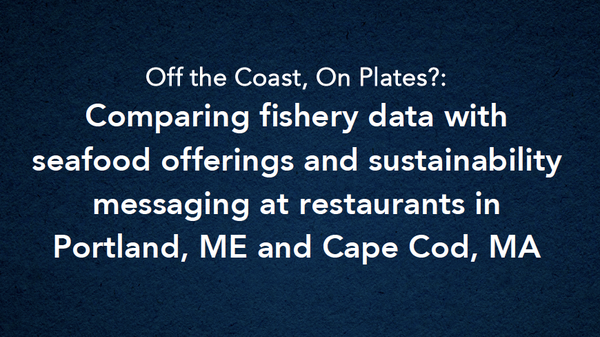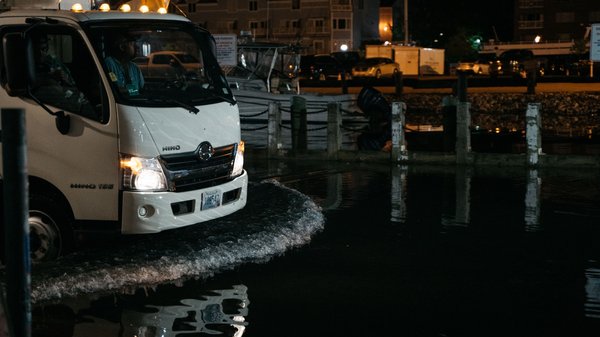Research Experience for Undergraduates
Providing undergraduates with cutting edge research opportunities.
Research Experience for Undergraduates (REU) sites provide students from diverse backgrounds the chance to immerse themselves in their host institutions' research methods and cultures. At GMRI, one of nearly 700 NSF-funded REU sites across the country, we introduce students to an exciting diversity of marine and fisheries science opportunities. Students lead projects in fisheries ecosystem research, with a particular focus on the impacts of Gulf of Maine warming trends, and develop skills that prepare them for what to expect in graduate school or related research careers.
Project Goals:
- Provide an authentic, inclusive summer research experience for a diverse range of undergraduate students.
- Facilitate independent, student-led research projects that contribute to our understanding of the Gulf of Maine ecosystem.
- Prepare students for graduate school and fulfilling careers in STEM fields.
Applications for 2025 are now closed
Interested in joining us for your REU experience? Please check back in January of 2026 for application information about the 2026 program.
-
Final Presentation Symposiums
REU interns produce reports, blog posts, photos, and more during their time at GMRI, and the summer culminates with a presentation symposium. Explore some of the topics and presentation titles from previous years here.
-
![Basic graphic for the year 2024.]() 2024 Final REU Symposium
2024 Final REU Symposium
-
![A basic graphic for the year 2023.]() 2023 Final REU Symposium
2023 Final REU Symposium
-
![A basic graphic for the year 2022.]() 2022 Final REU Symposium
2022 Final REU Symposium
-
![A basic graphic for the year 2021.]() 2021 Final REU Symposium
2021 Final REU Symposium
-
![A basic graphic for the year 2020.]() 2020 Final REU Symposium
2020 Final REU Symposium
-
![A basic graphic for the year 2019.]() 2019 Final REU Symposium
2019 Final REU Symposium
Understanding the impacts that climate change has on our coupled natural and human systems is a major challenge of our time. The Gulf of Maine is warming faster than 96% of the global ocean, meaning GMRI is strategically positioned to conduct cutting-edge research on this issue. This includes documenting and monitoring change, as well as predicting and mitigating future impacts of climate change on ecosystems and the people who depend on them. We welcome undergraduate students to take part in our work and contribute to our understanding of climate change and its impacts on our coastal and marine ecosystems, communities, and industries.
We pair students with GMRI researchers engaged in a range of climate, ecosystem, fisheries, oceanographic, economic, social science, science-of-learning, cognitive science, and interdisciplinary studies. Students then have the chance to work with their mentors to design and conduct an intensive 10-week independent research project. Projects often involve field sampling, laboratory experiments, data compilation and analysis, computational simulations, policy analysis or any range of top tier research methods that help them address their research questions. At the end of the summer, students present their findings at an in-house symposium using analysis and communications skills honed throughout the summer.
Throughout the summer students are also exposed to the range of initiatives ongoing at GMRI, including those within our education, community, climate center, and ventures programs, and they will receive career and graduate school advice. This opportunity includes a stipend ($600/week for 10 weeks), housing, a meal allowance and travel support.
-
Examples of student work
Explore some of the reports and stories our previous REU students produced.
-
![]() Anna Yankee, 2023 REU Student Report
Anna Yankee, 2023 REU Student Report
-
![A truck drives through a flooded street at night.]() Connor Brooks, 2022 REU Student Blog Post
Connor Brooks, 2022 REU Student Blog Post



REU Mentors
Program Sponsor

This program is made possible through the generous support of the National Science Foundation.
Read More
-
![Intern Reflections 2024: Why Choose GMRI?]()
Intern Reflections 2024: Why Choose GMRI?
Our summer intern season is wrapping up for 2024, and so we decided to catch up with some of our departing interns to learn what …
Tidings
-
![Virtual Experience for Undergraduates]()
Virtual Experience for Undergraduates
While the outbreak of COVID-19 has led many REU programs to cancel their summer plans, we have chosen to move forward with our program virtually, …
Announcements
-
![Goodbye REU Interns]()
Goodbye REU Interns
As the weather turns and students head back to school, we say goodbye to our summer interns. This year, our intern program was bolstered by …
Tidings
-
![New: Research Experience for Undergrads]()
New: Research Experience for Undergrads
For over a decade, college students have participated in our robust summer intern program. Thanks to new funding from the National Science Foundation, we’re excited …
Tidings











